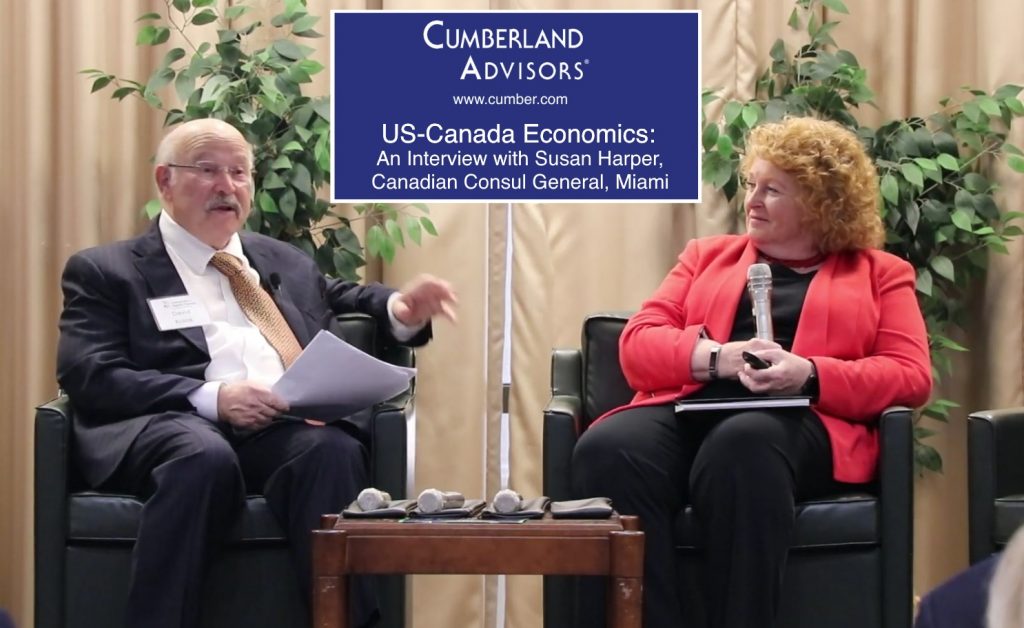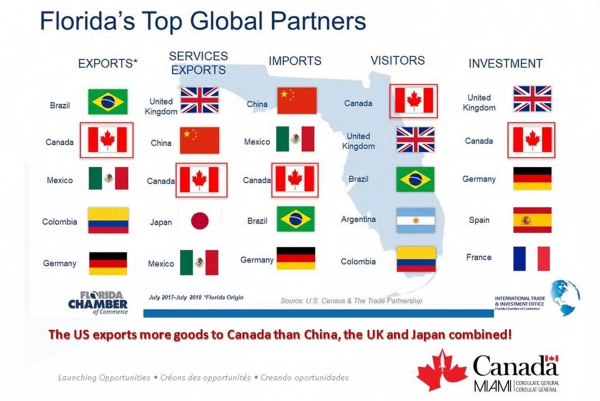Financial Markets and the Economy - Financial Literacy Day III, the conference that Cumberland sponsored at the University of South Florida Sarasota-Manatee (USFSM) on April 11, featured a conversation between myself and Susan Harper, Canada’s Consul General in Miami.

I opened the interview by expressing my personal view of the importance of the durable relationship between the US and Canada and why we must not undermine it. Then I gave Susan the floor. She shared with us some very interesting and quite eye-opening statistics on the US-Canada economic relationship.
The US and Canada are each other’s largest trading partners, but what is somewhat surprising is the extent and significance of the Canadian economic presence in Florida and in the Florida West Coast. Some 500 Canadian companies are present in Florida, at nearly 3500 locations.
Exports
When we think about the impact of a foreign country on our economy, we tend to think first in terms of exports – how much do we sell to them? Well, the US exports more goods to Canada than it does to China, the UK, and Japan combined (Source: Susan-Harper-Canada-Conversation-Slidedeck).
Among all nations, Canada ranks second in exports from Florida and third in services exports. Canada is also third in imports to Florida, first in visitors to Florida, and second in investment in Florida (figures from the Florida Chamber of Commerce).
Thirteen percent of Florida’s exports go to Canada, an amount totaling $51.6 billion in 2018. For Hillsborough Co. (Tampa), those figures were 25% and $5.7 billion. The value of exports to Canada from other West Coast counties is as follows:
| Pinellas (St. Pete, Clearwater) | $381 million |
| Manatee | $72 million |
| Sarasota | $99 million |
| Charlotte | $29 million |
| Lee | $72 million |
| Collier | $100 million |
Source: Susan-Harper-Canada-Conversation-Slidedeck
Jobs
Susan told us that if trade with Canada ceased, 600,000 (plus or minus 20,000) jobs would be lost in Florida. She had figures on potential West Coast county job losses, too:
| Hillsborough (Tampa) | 77,420 |
| Pinellas (St. Pete, Clearwater) | 25,507 |
| Manatee | 5,951 |
| Sarasota | 8,062 |
| Charlotte | 2,111 |
| Lee | 8,286 |
| Collier | 9,594 |
Source: Susan-Harper-Canada-Conversation-Slidedeck
Tourism
Canadians are by far the largest source of international tourism to Florida. (The UK is second, with about half Canada’s total.) In 2018, some 3.5 million Canadians visited Florida (out of a total Canadian population of 35 million)! Of that number, 26% visited Tampa and 12% visited Sarasota (Source: Susan-Harper-Canada-Conversation-Slidedeck).
Real estate
Canada’s residential real estate portfolio in Florida totals $53 billion, with about $4 billion (net) purchased annually. Thus Canadians contribute over $500 million a year in property taxes.
Note residential real estate portfolio figures for the West Coast counties:
| Hillsborough (Tampa) | $35 million |
| Pinellas (St. Pete, Clearwater) | $142 million |
| Manatee | $121 million |
| Sarasota | $194 million |
| Charlotte | $50 million |
| Lee | $471 million |
| Collier | $630 million |
Source: Susan-Harper-Canada-Conversation-Slidedeck
Issues
Pondering this data, I remarked to Susan, “When you think about the conversation about tariffs, trade, and all the flow of news, there is a different perspective when this kind of information is in front of you.” We then tackled some of the issues that are disrupting the US’s relationship with its most important economic partner.
The perverse notion that Canada is a security and defense threat to the US was invoked by the Trump administration in order to levy steel and aluminum tariffs. Ironically, the administration has subsequently granted far more waivers of these tariffs to Chinese firms than to Canadian ones. According to Susan, for the 25% steel tariffs, 40% of waiver applications from China have been granted, but only 2% of those from Canada. For the 10% aluminum tariff the ratio is even worse: 85% of Chinese waivers have been approved, but only 0.2% of Canadian ones.
The irony is heightened by the fact, as Susan noted, that the Canadian armed forces and Mounties have a substantial presence right in Florida itself (as well in many other states), through joint US-Canada defense and security arrangements. For instance, Americans and Canadians work together at the major NORAD (North American Aerospace Defense Command) facility at Tyndall Air Force Base in the Florida Panhandle. Susan mentioned that a Canadian was actually in charge there when the 9/11 attacks struck, and so he was responsible for the defense of US air space.
Susan was vehement in expressing her feelings about the steel and aluminum tariffs:
“Canadians find it insulting to be considered a national security risk to Americans, given our history and our current situation. You know, we’re people; we’re hurt by this. Secondly, we consider it an illegal application of tariffs; it’s an illegal tax. Canada has had to retaliate in an equal amount. This has been very bad for US business, and obviously it’s bad for Canadian business. But it’s bad for US business, and now we’re seeing some of the implications.”
She added: “The Manufacturing Association of Florida has come out very vocally against these tariffs.”
She summarized the economic argument by saying, “We build things together”; and she gave us an amusing but instructive example: The Canada-Florida Burger, comprising a baked bun and ketchup from Ontario and beef from Alberta, married with onions, mushrooms, tomatoes, and lettuce from Florida.
You can view my full interview with Susan Harper at this link or embedded below: https://youtu.be/_jwOOIUmSV4. Her presentation slidedeck is available here as a PDF: https://www.cumber.com/pdf/Susan-Harper-Canada-Conversation.pdf.


